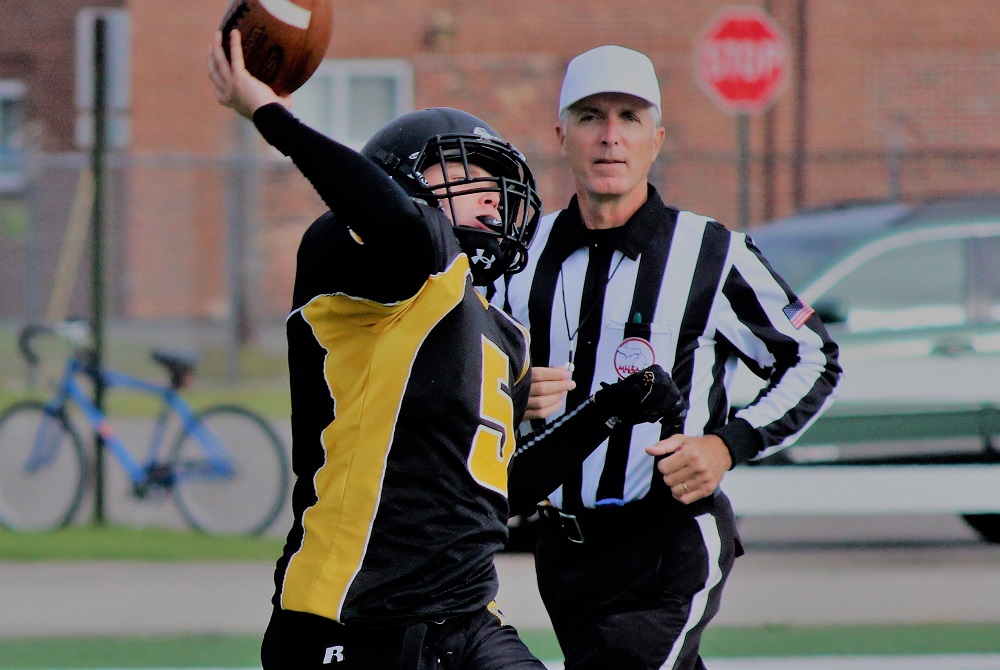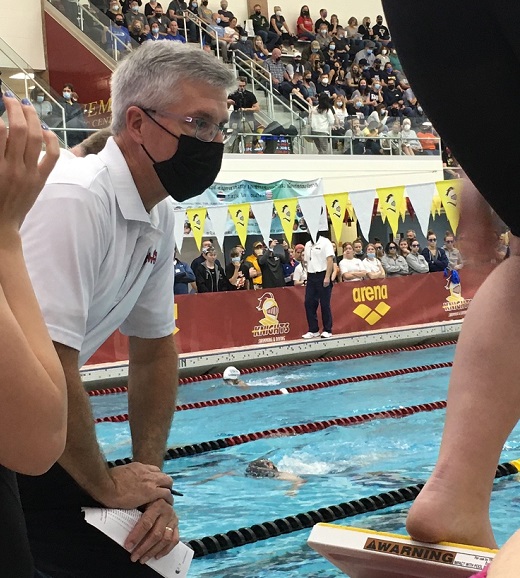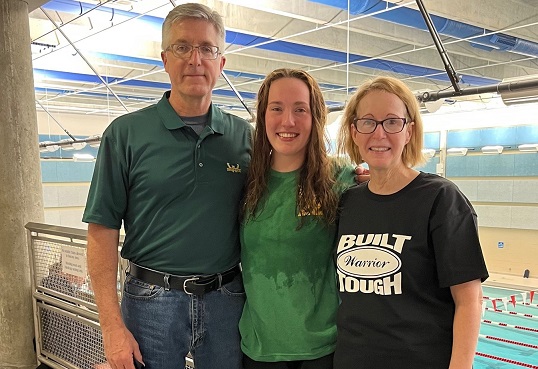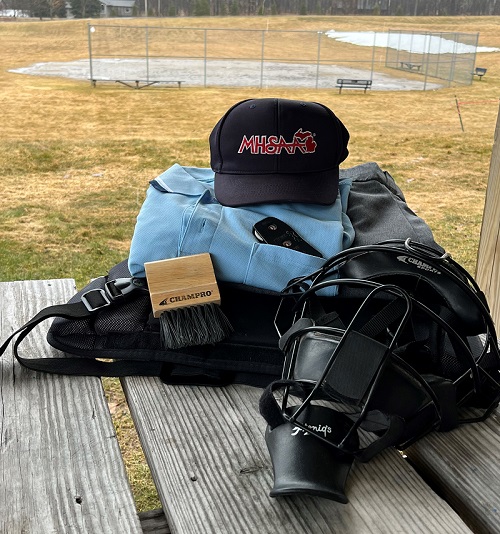
'22 Game' Lasts 2 Plays, Lives on
By
Ron Pesch
MHSAA historian
October 26, 2015
What would you do with 22 seconds to right a wrong?
In Michigan, the longest football game in high school sports history was played on September 23, 1977 when Detroit Southeastern defeated Detroit Northeastern 42-36 in nine overtimes.
But what is the shortest?
On the evening of Thursday, Nov. 5, 1953, Eaton County foes Bellevue and Vermontville squared off in a Tri-C Conference battle. It was a home contest for Vermontville, but without illumination at its field, the game was staged just west beneath the lights at Nashville High School in Barry County.
The dominant team in Tri-C play over the previous three years, Bellevue’s Broncos had posted three consecutive undefeated seasons from 1950 and 1952. However, graduation took its toll and with only five returning veterans in the fall of 1953, Bellevue lost its nonconference season opener to Homer. The Broncos had also dropped a pair of league contests, to Lake Odessa and Olivet, just prior to the Vermontville game, and entered with a 4-3 record.
Vermontville brought a 4-2 mark into the contest, and was in a four-way tie with Bellevue, Nashville and Lake Odessa for second in the conference.
The Broncos and Wildcats were evenly matched and played to a scoreless tie in the first half. Vermontville opened up a 6-0 lead on a 20-yard end sweep by the Wildcats’ quarterback Pete Benton in the third quarter, but entered the final minutes of the game trailing 12-6 thanks to a TD run by Bellevue’s Jim Smith and an early-fourth quarter scoring pass from Smith to Bob Babbitt.
Coach Dave McDowell’s Wildcats mounted a long final drive, and fans strapped in for a thrilling finish. Pushing deep into Bellevue territory, Vermontville faced a fourth down and eight from the 16-yard line with under a minute to play when Benton launched a desperation pass to the end zone.
The pass fell incomplete, but Bellevue was flagged for pass interference. Officials stepped off the penalty and awarded Vermontville the ball at the one-yard line, but the Wildcats’ plunge into the line fell an inch short on what was called a repeated fourth down play. Vermontville took possession and ran out the clock.
Following the game, Coach McDowell protested the ruling to officials, correctly stating that his team should have been awarded an automatic first down and goal from the 1-yard-line on the penalty, according to high school rules. Appealing the call, the situation was brought to the attention of the league, MHSAA executive director Charles Forsythe and the MHSAA athletic board.
On Wednesday, Nov. 11, the state athletic board agreed an error had been made, but did not order a replay. Instead, they noted three possible solutions:
- Result left as it was.
- Called a no contest.
- Replay it at the point of infraction.
The board moved a final decision back to the league. Because of the possible impact on the final conference standings, and eventually, the awarding of the league’s all-sports trophy, the Tri-C Conference opted to replay the contest from the point of infraction – the 1-yard line – with 22 seconds placed on the clock.
 The news of the league’s decision was blasted out by the news services nationwide, and immediately, the pending replay of a small town contest captured the imagination of reporters and sports fans across the United States.
The news of the league’s decision was blasted out by the news services nationwide, and immediately, the pending replay of a small town contest captured the imagination of reporters and sports fans across the United States.
“Shortest ‘Game’ in History?” read the headline in the Lexington, Kentucky Herald. From Biloxi, Mississippi, to Boston, Massachusetts, from Rockford, Illinois to Omaha, Nebraska and Seattle Washington, sports aficionados read the news about the error. Best of all, details flowed forth on the plan to replay critical seconds that might alter the result, fulfilling every fan’s dream.
So began the longest huddle in history.
“What would you do?” was the question on the lips of coaches and followers in barber shops and factories. Detroit Free Press writer George Puscas asked that very question to some of Michigan’s top coaches.
Detroit Lions coach Buddy Parker offered his advice to Vermontville’s coach McDowell.
“The other team will be expecting a run,” noted Parker, “so I would fake a run off tackle then throw a pass in the other direction – with three receivers downfield.”
Michigan State’s legendary Biggie Munn stated the obvious:
“Call a scoring play.”
University of Michigan head coach Bennie Oosterbaan was tied up preparing for the Wolverines’ upcoming contest with MSU, so instead U-M end coach Bill Orwig weighed in with a tongue-in-cheek recommendation:
“Take the time out.”
Earl “Dutch” Clark, in charge at the University of Detroit, suggested that McDowell diagram “two of the most unusual offensive formations … anything to confuse the defense. The first play should be a running play and if it didn’t work, take time out then try again.”
Wayne University’s coach Lou Zarza was the most specific of them all.
“On a goal line stand, the defense usually drifts toward the middle. So I would fake the ball to the right halfback on a slant, then send the fullback with the ball wide to the right, outflanking the defense. It’s a good goal line play on the T formation.”
Suggestions came from all over. A gentleman in Syracuse, New York, even penned a personal letter to McDowell with a sure-fire suggestion.
Three days after the 1953 prep season had officially ended, on the afternoon of Monday, Nov. 16, the same officiating crew and the Vermontville and Bellevue squads emerged and again travelled to Nashville to line up for what can arguably be called the shortest – or perhaps the longest – game in high school football history.
Reporters from Detroit, Grand Rapids, Lansing and Battle Creek converged on the city for 22 seconds of football. High school reporting legends Hal Schram of the Detroit Free Press, Bob Hoerner of the Lansing State Journal, George Maskin of the Detroit Times, Harry Stapler of the Detroit News and writers from the Associated Press and United Press International all descended upon mid-Michigan, “almost as if the Rose Bowl was to be played.”
“That game brought more publicity to coach Gordon Korstange’s 6-3 squad then his teams received for posting three consecutive unbeaten seasons in 1950, 1951 and 1952,” recalled 80-year old Burton H. Brooks, who was the only reporter who had covered the original contest, and one of many covering the replay. A graduate of Bellevue, he was a freshman at Michigan State at the time, earning money as a sports stringer for the Bellevue Gazette and Charlotte Republican Tribune.
Beneath sunny skies, “a crowd of over 500 fans and curiosity seekers, most of them attired in shirt sleeves, lined the field on both sides near the east end of the Nashville gridiron,” wrote Brooks, many years later. “At 5:00 the shrill blast of an official’s whistle split the air, announcing time for the game.”
Attendance was way up from the original contest, and in an unusual move for the time, Kalamazoo television station WKZO announced that they would send a crew to Nashville and then televise the game – (all 22 seconds of it!) – Tuesday evening. In addition, 10 newspaper photographers were on site to capture images from the game.
While the size of the crowd was up, turnout on the football squads had decreased. Vermontville dressed its full squad of 24 for the showdown, but kept out two regular tackles and his first-string quarterback, as all had been on the injured list at the end of the first clash.
Meanwhile, Bellevue brought only 14 players.
“Just our defensive unit and enough to run back the kickoff,” Korstange told the Lansing State Journal, prepared for a situation that could arise if Vermontville scored.
“Three of the defensive starters had decided to go deer hunting instead,” said Brooks discussing the shortened game, “so Bellevue needed to call up some kids for the game from the junior varsity squad.”
“Bellevue won its sixth game of the year, downing Vermontville in a sensational goal line stand in the famous ‘22’ Game” at Nashville last Monday,” wrote Brooks in the Bellevue Gazette. “Coach Dave McDowell’s Wildcats ran two plays against Bellevue, but couldn’t dent the solid Bronco defense. On the first play the Wildcats sent big Bob Steward up center, but he was driven back a yard by the entire center of the Bellevue line.”
 Following a timeout, the Green and White tried to sneak quarterback Pete Benton across the line to the left of center as the ball carrier on the second play, but the hole was quickly plugged by tackle Donald Rogers and guard Jerry Babbitt. Steward had been stopped by Bellevue guard Wayne Lesser. Dale Spotts, Bob Babbitt, Harold Messenger, Ralph Hales, Dick Moon, Jim Smith, Gordon Smith, and Ed Bessemer filled the other defensive spots and ensured the result of the first game went unchanged.
Following a timeout, the Green and White tried to sneak quarterback Pete Benton across the line to the left of center as the ball carrier on the second play, but the hole was quickly plugged by tackle Donald Rogers and guard Jerry Babbitt. Steward had been stopped by Bellevue guard Wayne Lesser. Dale Spotts, Bob Babbitt, Harold Messenger, Ralph Hales, Dick Moon, Jim Smith, Gordon Smith, and Ed Bessemer filled the other defensive spots and ensured the result of the first game went unchanged.
Once again, the wire services blasted their report from sea to shining sea.
“Officials Didn’t Rob Vermontville Team” screamed the headline in the Miami Daily News. Beneath an AP photo, residents of the Florida town were treated to a detailed account of the contest.
“Prep Grid Game Ends Same Way Following 11-Day Break” read the caption in the Dallas Morning News in football-crazed Texas.
“Replayed Grid Game Ends with the Same Result as Before,” read the headline in the Seattle, Washington, Daily Times.
As noted at the time, it certainly wasn’t the first, nor would it be the last, that a refereeing crew made a mistake in a game. Fans then, like now, were reminded officials are only human.
Bellevue ended the extended season in a tie for second with Lake Odessa, with 5-2 marks. For the first time in league history the Tri-C gridiron championship was awarded to Olivet, which, at 8-0, posted its first unbeaten season and, as it turned out, unseated Bellevue for the league’s 1953-54 all-sports trophy.
More than 60 years later, a forgotten showdown between high school football teams, played out before national attention in little Nashville, Michigan, still stands as one of the most entertaining and unusual sports moments in the history of America.
 Ron Pesch has taken an active role in researching the history of MHSAA events since 1985 and began writing for MHSAA Finals programs in 1986, adding additional features and "flashbacks" in 1992. He inherited the title of MHSAA historian from the late Dick Kishpaugh following the 1993-94 school year, and resides in Muskegon. Contact him at [email protected] with ideas for historical articles.
Ron Pesch has taken an active role in researching the history of MHSAA events since 1985 and began writing for MHSAA Finals programs in 1986, adding additional features and "flashbacks" in 1992. He inherited the title of MHSAA historian from the late Dick Kishpaugh following the 1993-94 school year, and resides in Muskegon. Contact him at [email protected] with ideas for historical articles.
PHOTOS: (Top and below) What's believed to be a Battle Creek Enquirer photo shows one of the goal line stands by the Bellevue defense against Vermontville. (Middle) The Lansing State Journal reported on the nationwide reporting of the "22-second game."

Official's List of 'Favorite' Sports Grows with Dedication to Making Our Games Go
By
Tom Spencer
Special for MHSAA.com
April 8, 2022
Any season. Any MHSAA sport.
 Well, almost any.
Well, almost any.
You name it, and likely Jeff Brunner has officiated it. He may even have been selected to officiate an MHSAA Final in the sport as well.
He first started as a baseball umpire right out of high school. Family and work life created a 20-year absence from officiating for the 1979 grad of Romeo High, where he had played baseball for the Bulldogs.
Brunner, a 20-year MHSAA registered official, is about to work his favorite sport – softball – again. But, the 60-year-old readily admits he loves games so much, the favorite sport can change regularly for him.
“It’s kind of whatever is in season,” Brunner said of naming a favorite. “I love the pace of the game of softball, and I am a big proponent of providing as may opportunities for girls to play sports, whatever that sport may be.
“For that reason I gravitated towards softball.”
He’ll have to wait though to get on the field. Both of his games were cancelled this week due to weather-related complications.
 “Weather can create havoc with spring sports schedules – more so than any other season – so from an officiating standpoint, you have to count on some games being postponed or cancelled,” he acknowledged. “You just have to go with the flow and be ready to work when the weather allows.
“Weather can create havoc with spring sports schedules – more so than any other season – so from an officiating standpoint, you have to count on some games being postponed or cancelled,” he acknowledged. “You just have to go with the flow and be ready to work when the weather allows.
“I feel a bit bad for softball and baseball players in particular, because those seasons are so short to begin with, and every contest date is important,” he went on. “When bad weather causes cancellations as a result of rain or the extension of winter, it makes the high school season that much shorter for the athletes.”
Brunner, a father of four grown children, is currently registered for softball, football, volleyball, swimming & diving and basketball. He once did lacrosse in addition to starting his officiating career with baseball.
“There is only so much time in the week,” he said. “I can’t do everything.
“I have at least one sport for each of the three sporting seasons,” he continued. “It’s fun.”
Brunner watched his three daughters grow up playing softball and competing in swimming. His son played baseball and competed in swimming. They all graduated from Traverse City St. Francis, swimming through a co-op program. His daughters were all pitchers for the Gladiators. Their first pitching coach was Dad.
His youngest daughter, Julia, just finished competing for Wayne State University at the 2022 Division II Women’s Swimming & Diving Championships in Greensboro, N.C.
It was his kids that got him into officiating, along with the extra money. But today, it’s just to be a part of a game.
“We were always around sports,” Brunner said. “I thought about officiating for a while.
“Originally I did it to maybe earn just a little bit of extra money, get a little bit of exercise, and kind of stay close to the game,” he continued. “Now, it is just plain fun — it’s fun to be around a game, whatever that game is.”
During his officiating career, Brunner has been selected to officiate MHSAA Finals in swimming & diving and football. He’s not likely to get the chance to umpire a baseball or softball Final as his other business obligations interfere with MHSAA spring postseason play.
 While working a Final is a goal of most all MHSAA officials, Brunner said it is just another game once it starts. He sees the Final as a great experience for all coaches, participants, fans and officials.
While working a Final is a goal of most all MHSAA officials, Brunner said it is just another game once it starts. He sees the Final as a great experience for all coaches, participants, fans and officials.
“MHSAA always does a great job of putting on a Final,” he said. “It’s always special.
“You have a few butterflies prior the game or the meet, but once things start you started focusing on the game itself.
The longer Brunner officiate, whatever the sport is, he believes the key to making the right call often comes down to mechanics.
“Mechanics were drilled into me when I first started,” Brunner said. “A lot of making the right call in my opinion is having the right mechanics and knowing where to be.
“You need to be in a good position to make the call.”
Many veteran coaches have noticed Brunner prides himself on being in the right position, and more. It is noted game after game, season after season.
“Jeff Brunner is the consummate professional as an umpire,” said Dave Kennedy, Traverse City West’s varsity softball coach. “He is excellent with his calls and positioning, but he is most concerned about getting the call right.
“Every time I see I have Jeff as part of the umpiring crew for my games, I know the game is going to be very well officiated,” Kennedy continued. “We are lucky to have Jeff as one of our officials in Northern Michigan — he’s definitely one of the best.”
 "As an umpire, Jeff's professionalism and easy demeanor are much appreciated,” Hawkins said. “He runs the games he works in such a way that the focus stays on the players.
"As an umpire, Jeff's professionalism and easy demeanor are much appreciated,” Hawkins said. “He runs the games he works in such a way that the focus stays on the players.
“Jeff may not know every player on the field personally, but I'm convinced that Jeff takes on his job, which is a difficult one, for them – the players."
Brunner and his son Andrew’s high school baseball experiences made it easy for Jeff to jump into baseball — and the same was true for softball due to his pitching girls. Swimming & diving, though, has been perhaps the most challenging sport to learn how to officiate for Brunner.
Watching his four children compete in pools over the years was a big help. The physical aspect was much easier, but maybe not the rules.
“The hard part is knowing all the rules … knowing what is a legal stroke and what is not,” he said. “It was an easy transition — we had seen so many swim meets.”
Today Brunner is anxiously waiting to get back on the softball field. He’s got his gear ready in anticipation of calling his first pitch of the 2022 season.
 Tom Spencer is a longtime MHSAA-registered basketball and soccer official, and former softball and baseball official, and he also has coached in the northern Lower Peninsula area. He previously has written for the Saginaw News, Bay County Sports Page and Midland Daily News. He can be reached at [email protected] with story ideas for Manistee, Wexford, Missaukee, Roscommon, Ogemaw, Iosco, Alcona, Oscoda, Crawford, Kalkaska, Grand Traverse, Benzie, Leelanau, Antrim, Otsego, Montmorency, Alpena, Presque Isle, Cheboygan, Charlevoix and Emmet counties.
Tom Spencer is a longtime MHSAA-registered basketball and soccer official, and former softball and baseball official, and he also has coached in the northern Lower Peninsula area. He previously has written for the Saginaw News, Bay County Sports Page and Midland Daily News. He can be reached at [email protected] with story ideas for Manistee, Wexford, Missaukee, Roscommon, Ogemaw, Iosco, Alcona, Oscoda, Crawford, Kalkaska, Grand Traverse, Benzie, Leelanau, Antrim, Otsego, Montmorency, Alpena, Presque Isle, Cheboygan, Charlevoix and Emmet counties.
PHOTOS (Top) Official Jeff Brunner has his eyes on the action while officiating a football game. (2) Brunner monitors a starting block during November’s MHSAA Lower Peninsula Division 3 Swimming & Diving Finals at Calvin University. (3) Brunner and his wife Michelle support daughter Julie at March’s Great Lakes Interscholastic Athletic Conference championship meet. (4) Brunner’s gear sits ready for his first game this week before it was canceled due to bad weather. (Photos courtesy of the Brunner family.)

